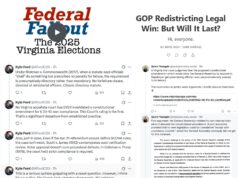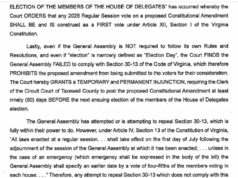Del. Mark Levine (D-Alexandria/Arlington) responds to this op-ed (“In redistricting, ‘compromise’ isn’t a bad word”) in the Roanoke Times (10/11) by Kathay Feng, national redistricting director at Common Cause.
Wow. This article is the clearest example yet of why you cannot trust national groups who haven’t read legislation to comment on it. How embarrassing for Common Cause to put forward a commentator who has ZERO CLUE as to what Amendment 1 does. It’s only three or four pages long, and yet Ms. Feng clearly hasn’t even read it, as I will illustrate below. And to be clear, I say she hasn’t read it, because the only other logical conclusion is that Ms. Feng is intentionally trying to deceive us. She seems too nice for that. But I’m sorry. No academic researcher who does not do their basic homework should be able to opine on anything. I think Common Cause needs to let Ms. Feng go or at least issue an apology, because I, for one, will never take them seriously again as long as they allow such blatantly false propaganda to come forward. We get it. You oppose gerrymandering. But unless you READ what you say you support, you have zero credibility. ZERO.
I also would be willing to post all of this in an op-ed, except time is running out and Election Day is Tuesday. Full disclosure, I am a Virginia State Delegate, and unlike Ms. Feng, I have read Amendment 1 and know what it says. I’m embarrassed for her that she is so clueless as to having written an article based on talking points and not facts. I get that as a national organization, Common Cause has little time to actually read legislation. But they shouldn’t endorse something if they don’t know what it does. I will now go through her article point by point to show how inaccurate it is.
First point. The author clearly opposes gerrymandering. So do I. The issue is not whether gerrymandering is a good thing or not. The issue is whether Amendment 1 promotes or inhibits gerrymandering. Because, as I will show, Amendment 1 was written by gerrymanderers in order to increase gerrymandering (and enshrine it in the Constitution), I urge every Virginian regardless of political party to vote NO on 1.
Second, she claims “Virginia’s current system” allows incumbent politicians “to give an advantage to themselves and their party to win elections.” In saying so, she seems completely unaware of HB1255/SB717, Virginia’s new law as of July 1, 2020 that bans partisan political gerrymandering. You’d think a so-called national advocate would be aware of the first legislature in the country to ban partisan political gerrymandering. How embarrassing she is apparently unaware of this!
Third, she claims the amendment has a “citizen-led commission,” apparently unaware that all the so-called “citizens” are in fact appointed by four party leaders. Again I will assume cluelessness rather than intentional deception. This is what happens when you read talking points and believe them without checking on them. The “citizens” would all be close associates of party leaders, such as their friends or family members. If Trump were to nominate Ivanka as a “citizen” to serve on a panel, would Ivanka really lead the panel or would it be Trump all along?
Fourth, she lauds transparency, apparently unaware that I, as Chair of the Virginia Transparency Caucus, brought about archiving and streaming of all future committee and subcommittee hearings in Virginia, including on redistricting. That’s the status quo. As for the Amendment, she is apparently unaware that if legislators exercise the “poison pill” option whereby just two of them scuttle the Amendment, all transparency gets thrown out with it. Again, national advocates should READ what they’re talking about and not just make assumptions as she does.
Fifth, she claims Amendment One adds civil-rights protections, but she doesn’t name them, so I doubt she knows what they are. I’m happy to share here: the Amendment requires Virginia to obey the US Constitution and Federal Law. But clearly Ms. Feng must know already that every state is already required to do this. The Amendment does not add a single civil rights provision other than what is already in (changeable) federal and state law. It says policymakers should “consider” racial fairness “where practicable.” That is such weak tea that both Virginia’s NAACP and Latin advocacy groups roundly oppose it because there is zero protection against racial gerrymandering or even a guarantee of a seat at the table. But again, Ms. Feng is not in Virginia and so has not a clue as to why communities of color are up in arms in opposition against this Amendment. (At least I don’t think she’s in Virginia. I’m giving her an out here.)
Sixth, Ms. Feng claims the Amendment would “end partisan gerrymandering in Virginia once and for all.” No doubt she is unaware that even the Amendment’s patrons have publicly conceded the Amendment expressly allows partisan political gerrymandering. That, plus her ignorance of the fact that Virginia current bans partisan political gerrymandering but that such a law could be repealed, shows that the truth is exactly 180 degrees opposite from what she states here. Again, no fair observer who was aware of the facts would make such a statement in express opposition to direct objective fact.
Seventh, Ms. Feng does accurately state the referendum was forged in bipartisan compromise – but without noting that the compromise was between the leading Senate Democratic gerrymanderer, with his dream of an incumbent protection gerrymander, and the leading House Republican gerrymanderer, with his dream of a partisan political gerrymander. Nor does she mention it was forged non-transparently, without any people of color allowed to attend the secret meeting, nor that we were given less than an hour to read and vote on it.
Eighth, Ms. Feng lauds the supermajority requirement without mentioning that just two legislators – and they can both be from the same party both picked by the same party leader – can scuttle the entire commission. Because she does not state, or even appear to understand, what happens if the commission is scuttled – that the entire matter is then determined in secret by only Republicans – she appears to think that this will lead to some kind of compromise or fairness. She even claims “one partisan faction cannot overpower the rest”!!! So let’s have a thought experiment. You and I are negotiating over how to divide up a $1000 prize. If either you or I disagree, the decision-making goes to my best friend and crony who in his sole discretion can give the $1000 to you, to me, or to pocket it himself. Think that would lead to a compromise between you and me? I think you’d have every incentive to compromise lest I let my friend decide where the money goes. But my incentive to compromise? Not so much.
Ninth, the author claims “communities that have never been at the political table” will have “a chance to be heard.” How’s that going to happen when four party leaders or their appointees make all the decisions? If voters vote NO, we can guarantee communities that have never been at the political table will have a chance to be heard. A YES vote does the exact opposite.
Tenth, the author claims the Amendment shifts power from “politicians drawing maps behind closed doors to a public panel led by voters.” Yet the only thing that makes voters more cynical than having “politicians drawing maps behind closed doors” is having them appoint ersatz voters to do their bidding. At least the former is honest while the latter is Orwellian.
Eleventh and finally, this is the funniest part of all. The author lauds the “art of listening.” If the author had taken a mere half an hour to listen to the NAACP or other critics of the Amendment – or simply to read it – she would know how ridiculous the false and deceptive statements she has made are. The author’s failure to listen belies her airy promise to elevate listen. If you refuse to listen to others, how can we take your devotion to “listening” seriously at all?
I invite the author of this piece to either issue a correction or to “listen” to the critiques I and so many Virginians have made about this ridiculously flawed Amendment which would increase gerrymandering in Virginia and enshrine it forever in our Constitution. I realize, as a national advocate, she has little time to focus on Virginia or even read our proposed amendments. But maybe in the future, if she doesn’t have time to study a proposal, she shouldn’t opine on it. The same goes for Common Cause.


![CNU Wason Center Poll of Virginia: Trump Approval at Just 34%; “narrow majority support a constitutional [redistricting] amendment”](https://bluevirginia.us/wp-content/uploads/2026/01/wason0128-1-238x178.jpg)







![[UPDATED 1/29/26] Audio: Sen. Tim Kaine Talks to Blue Virginia About His “Five-Point Plan” to Fight Trump’s Orban-Like Assault on US Democracy; Civil Disobedience a la MLK Jr.; Trump’s Bogus “Energy Emergency”; the Crucial Importance of the 2025 VA Elections; etc.](https://bluevirginia.us/wp-content/uploads/2025/02/kaineinterview2-100x75.jpg)
